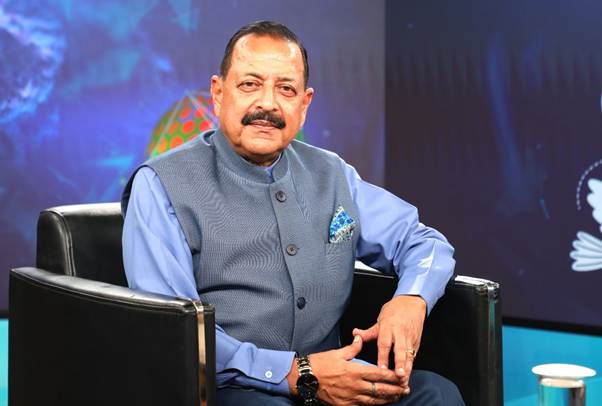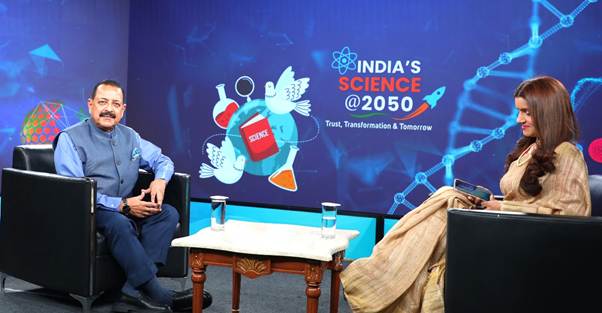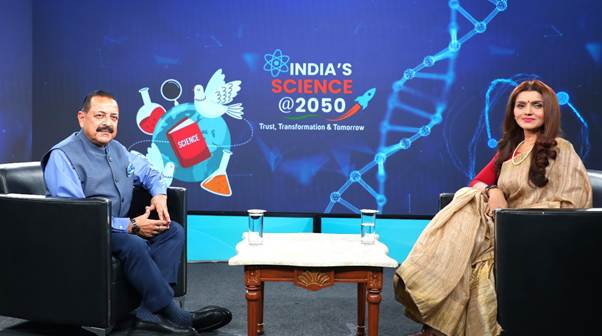Ministry of Earth Sciences
The upcoming 4-day India International Science Festival 2025 (IISF 2025) is a celebration of India's universal recognition as frontline global player: Dr. Jitendra Singh
IISF 2025 is being organised at Chandigarh from December 6 by the Ministry of Earth Sciences with collaboration of the Ministry of Science & Technology, and coordinated by the office of the PSA;
World Science Day Theme ‘Trust, Transformation and Tomorrow’ aligns with India’s future-ready Vision Under PM Modi: Dr. Jitendra Singh
This is one of the best times happening for Indian Science; the golden age for Indian youth, says the science minister
Posted On:
10 NOV 2025 6:03PM by PIB Delhi
Describing the upcoming 4-day India International Science Festival 2025 (IISF 2025) as a celebration of India's universal recognition as frontline global player, Union Minister of State (Independent Charge) for Science and Technology; Earth Sciences and Minister of State for PMO, Department of Atomic Energy, Department of Space, Personnel, Public Grievances and Pensions, Dr. Jitendra Singh, in an exclusive interview to Sansad TV on the occasion of the World Science Day, said, "This is one of the best times happening for Indian Science and the golden age for Indian youth".
This year’s World Science Day theme, “Trust, Transformation and Tomorrow", said the Minister, aligns with India’s future-ready vision under PM Narendra Modi.
The Science We Need for 2050”, perfectly encapsulates India’s scientific vision for 2047.
Dr. Jitendra Singh said that trust in science will grow when research becomes open, accessible, and reaches every household and language. He emphasized that transformation happens when the discoveries made in laboratories reach farms, classrooms, clinics, and startups, thereby strengthening the link between research and society. “The tomorrow of 2050 will be safer and sustainable only when the world moves together, from climate to biotech to deep ocean exploration,” he added.
Highlighting India’s growing stature in global science diplomacy, Dr. Jitendra Singh said that India is now not merely a participant but a leader shaping international scientific collaborations. He underlined that India’s scientific partnerships are now based on equality and mutual respect- a shift from earlier times when collaborations were unequal. “Today, when an Indian astronaut co-pilots the International Space Station, or Indian scientists lead global research projects, it reflects India’s scientific capability being acknowledged worldwide,” he noted.
Dr. Jitendra Singh said that the upcoming India International Science Festival (IISF), to be held in Chandigarh, will celebrate the universal recognition of India’s scientific success stories. The festival will feature global participation, serious scientific dialogues, panel discussions, sessions for women scientists, children, students, and startups, providing a vibrant platform for exchange of ideas. He stated that IISF aims to decentralize the celebration of science by hosting the event across different regions of the country- North, South, East, and West, in previous years such as Goa, Guwahati, and Nagpur, before coming to Chandigarh this year.
Dr. Jitendra Singh said that science and technology are “the margins of peace and prosperity,” noting that sustainable peace is possible only when every nation is connected through scientific progress. “When nations prosper scientifically, contradictions and conflicts diminish,” he remarked.
The Minister highlighted how technology has become the engine of India’s growth story over the past decade. He cited Prime Minister Modi’s consistent focus on technology-driven missions, from Clean India to Startup India, Digital India, Deep Ocean Mission, and Biotechnology for Youth and Livelihood, as an unprecedented example in India’s history. Dr. Singh said India is now among the top global players in emerging fields such as quantum technology, biotechnology, and deep ocean research, no longer a follower but a nation “beckoning others to follow us.”
He also emphasized India’s public-private partnership model in science, calling it a “paradigm shift” that has opened even strategic sectors like nuclear energy for private participation. “The era of working in silos is over. Today, India’s scientific ecosystem moves forward as one collective force,” he said.
Speaking about the government’s vision for a Bio-E3 Economy (Biotechnology for Environment, Employment and Economy), Dr. Singh said India is leading the global transition toward renewable and bio-based fuels. He cited the example of using used cooking oil to produce biofuel, a move that promotes sustainable behaviour, reduces environmental pollution, and supports self-reliance.
India’s biotechnology sector has seen exponential growth, from 50 biotech startups in 2014 to over 11,000 today, with market size rising from $10 billion to nearly $200 billion, expected to reach $300 billion soon. “Biotechnology will drive the next industrial revolution, and India is ready to lead it,” he said.
Dr. Jitendra Singh said, today’s generation has unprecedented access to technology and knowledge. He shared that students from remote areas are cracking IIT and scientific exams using just their mobile phones, a symbol of how digital access and scientific curiosity can transform lives.
“This is India’s time. The possibilities are limitless, and through the scientific ecosystem created by the government, today’s youth can fully realize their potential,” the Minister concluded.



*****
NKR/AK
(Release ID: 2188446)
Visitor Counter : 7805